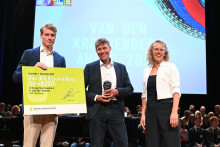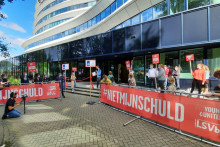`Whether it's about the lengthening of a contract or about a follow-up function after a doctoral degree, PhD-students are not positive at all', says Rick, who took a closer look at the aspect of job content and conditions. `The planned budget cuts are a part of that, say the interviewees. The subject of 'future perspective' wasn't explicitly mentioned, but more than half of the respondents talked on their own initiative about their chances. That was striking. That they think negatively was a source of concern.'
The research project came via university lecturer Nicole Torka (faculty of Business, Public Administration and Technology) to the three students. Thijs: `She researches employer involvement herself and she works with a lot of PhD-students. These aspects were combined into our assignment.'
Nicole Torka: `It's an exploratory study in the field of employer involvement. Up until now this study had only been done in other areas, such as firemen or metal workers. The qualitative results can be tested quantitatively in the next step of research.' Perhaps this is a task for a new group of students.
The qualitative study was conducted by the three bachelor students through interviewing 30 of the approximately 700 PhD-students. `We chose such a small number on purpose', says Thijs, `because we wanted to find out what they understood under employer involvement. Parallel to this we checked the satisfaction about it.'
The interviews plus a literature study came up with five areas on which the students could conclude. One overall finding was the inequality between departments. `Contract prolongation is one of those things', says Rick. `Sometimes a PhD-student is unable to finish his research within the allotted four years. In the current situation the dean and the supervisor have a huge influence on whether this prolongation will follow or not. This is often accompanied by the question of how much money is available. This way fate decides. That's why my recommendation is to use a stricter policy so that contract prolongation is assessed businesslike and objectively.'
Furthermore, the communication between departments is insufficient according to Wientjes. `A database of current studies can be the solution. That way you create more exchange of knowledge and interaction between departments. PhD-students can also find colleagues on the same area of research more easily.' The PhD-students are positive about the flexible working hours, holidays and the salary.
Erik van der Liet researched the role of executives and asked PhD-students about their supervisors. Here differences between departments are also noticeable. `At one department the supervision is excellent and at the other it is really bad. Sometimes the supervisor is not always in the office five days a week and some questions remain unanswered and the study halts. Introducing a clear appraisal system, among other things, may help to improve things.'
And what of the job conditions?
Thijs Plantagie, who researched this area, says: `The social aspect is excellent. The climate at work on both a social and a research level are good according to the interviewees. The sports facilities are also a big pro. A lot of PhD-students work themselves into a sweat in their lunch hour.'
The policy for foreign PhD-students also differs from one department to the next. Plantagie heard of two extremes. `One PhD-student had everything taken care and planned for him. From Schiphol to the first day at work, so to speak. Another student was having trouble with all kinds of things, like visa-application and accommodation.'
The three students recommend a welcoming package, with not only cheese and liquorice but also a lot of practical information. `And a buddy', suggests Rick, `someone who takes a PhD-student and leads him around, not only on the UT but also in private life.'
A last point is offering a course in the Dutch language. `UT-wide', says Rick. `Some departments offer one but by far not all of them. In a way this is logical, because the UT wants to promote English research; on the other hand it is a shortcoming because the working language is usually Dutch.'
Trans. Henriëtte van Dorp







